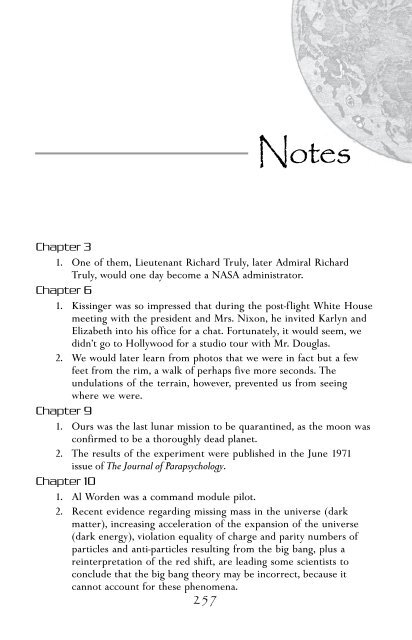edgar-mitchell
edgar-mitchell
edgar-mitchell
You also want an ePaper? Increase the reach of your titles
YUMPU automatically turns print PDFs into web optimized ePapers that Google loves.
Invisible Realities 129<br />
Problems also arise when we consider what is required to measure at<br />
this tiny scale. We must keep in mind that it takes at least a single photon<br />
of light to illuminate and thereby measure a particle. And to know in<br />
science is to measure. The energy imparted to the particle through the act<br />
of observing changes the attributes of the particle and makes its future<br />
state uncertain, a fact that must be considered in the measurement process.<br />
Historically, some have reasoned that the attempt to know is not only<br />
the cause of the uncertainty, but that it is, therefore, the process of knowing<br />
that influences the quantum processes of nature. But neither idea is<br />
correct. It is with this interpretation, however, that the Cartesian edifice<br />
of separateness of mind and matter begins to crumble.<br />
The fuzzy line between existence and knowing was destined to become<br />
even more confused by this interpretation, and led to more paradoxes. Some<br />
modern textbooks still produce contradictory viewpoints that reflect the<br />
desperation of those attempting to interpret quantum theory. It took 70<br />
years of experimental evidence and an understanding of how the mind<br />
manages information to bring some clarity to the issue. The account I am<br />
presenting here relies only upon analysis of mind processes, consciousness,<br />
and information. Yet it is corroborated by the experimental evidence from<br />
physics. It has occurred to me that the principles of complementarity and<br />
uncertainty apply equally well and in the same manner to the two means<br />
by which each of us observes: the sensory, or outer experience; and the<br />
inner, subjective experience. These two modes of observation are complementary<br />
in that both are required to complete our picture of reality. Yet<br />
they have different characteristics, and are not equally valid for all observations.<br />
The outer experience reaches its zenith in the scientific method,<br />
and is characterized by specificity, precision, and detail, and most often<br />
uses the language of mathematics—it is understood intellectually. The highest<br />
expression of the subjective experience is in the ineffable mystical insight.<br />
It is characterized by holistic patterns, and lack of precision, but deep<br />
feelings of certainty. By necessity, it must be expressed through metaphor,<br />
analogy, archetypal imagery, and the arts—its effect is emotional. The notion<br />
that science and religion are mutually exclusive expressions because they<br />
each emphasize a different mode of observation is no more valid than the<br />
idea that waves and particles are separate physical things. In both cases<br />
complementarity and uncertainty prevail, and in both cases it is mind that<br />
gives meaning to experience. Dogmatic acceptance of the Cartesian duality,<br />
particularly in the Western mind, has created an artificial barrier.<br />
Although science arose and has flourished for nearly four centuries as a<br />
result, a new synthesis is now required in order to proceed. Objective observation<br />
is not, strictly speaking, possible, as all observation is inherently a<br />
subjective experience.


